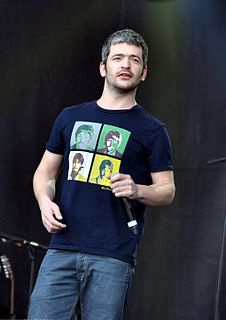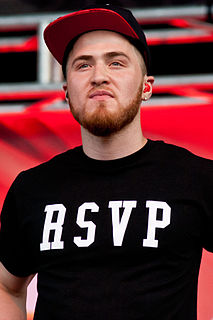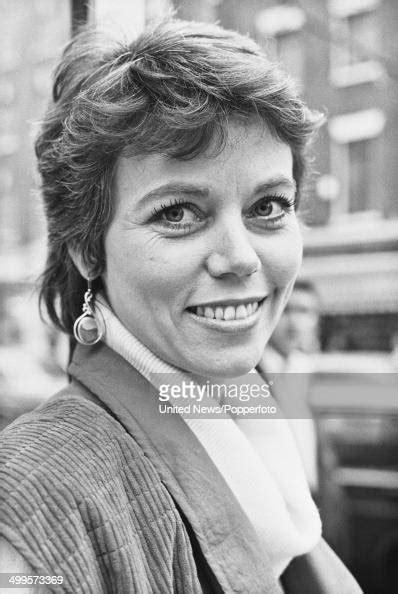A Quote by Edmund White
I never liked my father. He really was a dullard and misanthrope. My mother and he were married for 22, years and it was an ill match. She encouraged me to be a writer. She opened her home to black friends, and this was the 1950s. She didn't care later when I write about her.
Related Quotes
She'd assumed she'd be married and have kids by this age, that she would be grooming her own daughter for this, as her friends were doing. She wanted it so much she would dream about it sometimes, and then she would wake up with the skin at her wrists and neck red from the scratchy lace of the wedding gown she'd dreamed of wearing. But she'd never felt anything for the men she'd dated, nothing beyond her own desperation. And her desire to marry wasn't strong enough, would never be strong enough, to allow her to marry a man she didn't love.
I knew that our time together was almost over, I asked her if she liked sports, she asked me if I liked chess, I asked her if she liked fallen trees, she went home with her father, the center of me followed her, but I was left with the shell of me, I needed to see her again, I couldn't explain my need to myself, and that's why it was such a beautiful need, there's nothing wrong with not understanding yourself.
There was another reason [she] took her books whenever they went away. They were her home when she was somewhere strange. They were familiar voices, friends that never quarreled with her, clever, powerful friends -- daring and knowledgeable, tried and tested adventurers who had traveled far and wide. Her books cheered her up when she was sad and kept her from being bored.
She stared at herself in the mirror. Her eyes were dark, almost black, filled with pain. She'd let someone do that to her. She'd known all along she felt things too deeply. She became attached. She didn't want a lover who could walk away from her, because she could never do that - love someone completely and survive intact if her left her.
Her [Eleanor Roosevelt] father was the love of her life. Her father always made her feel wanted, made her feel loved, where her mother made her feel, you know, unloved, judged harshly, never up to par. And she was her father's favorite, and her mother's unfavorite. So her father was the man that she went to for comfort in her imaginings.
The idea of the book ["The Japanese Lover"] came in a conversation that I had with a friend walking in the streets of New York. We were talking about our mothers, and I was telling her how old my mother was, and she was telling me about her mother. Her mother was Jewish, and she said that she was in a retirement home and that she had had a friend for 40 years that was a Japanese gardener. This person had been very important in my friend's upbringing.
Blaire, This was my grandmother’s. My father’s mother. She came to visit me before she passed away. I have fond memories of her visits and when she passed on she left this ring to me. In her will I was told to give it to the woman who completes me. She said it was given to her by my grandfather who passed away when my dad was just a baby but that she’d never loved another the way she’d loved him. He was her heart. You are mine. This is your something old. I love you, Rush
My mother’s been living alone for over ten years. She gets up at six every morning. She makes herself a coffee. She waters her plants. She listens to the news on the radio. She drinks her coffee. She has a quick wash. An hour later, at seven, her day is over. Two months ago a neighbour told her about your blog, and she asked me to buy her one of those thingummyjigs – by a thingummyjig she meant a computer. And since then, thanks to your trimmings, your ribbon bows, your tie-backs for curtains, she’s rediscovered the joys of life. So don’t tell me you don’t know any answers.
I think Taylor Swift is a really good artist. I feel like her personality shines through everything she does, her music, her fashion, her style. She won Album of the Year, and she’s a really good writer. I’m a song writer so I respect artists who write their own songs. She won Album of the Year when she was 18 or something like that so, I think she’s dope.
In my earliest of years, my mother was a huge force in my life. She was for all intents and purposes, a single parent. My father had abandoned us. He was an alcoholic and a physical abuser. My mother lived through that tyranny and made her living as a domestic worker. She was uneducated but she brought high principles and decent values into our existence, and she set lofty goals for herself and for her children. We were forever inspired by her strength and by her resistance to racism and to fascism.
My house is full of paintings by my mother Pam. She was a fantastic, prolific artist but had no confidence in herself, thanks to my father running her down. They married during the war when she was 19 - she had planned to go to art school. But my father didn't want her to work, so she became a housewife.
One thing I did have under my belt was, my mother lost her mother when she was 11. She mourned her mother her whole life and made my grandmother seem present even though I never met her. I couldn't imagine how my mom could go on but she did, she took care of us, she worked two jobs and had four children. She was such a good example of how to conduct oneself in a time of grief. When I lost my husband, I tried to model myself as much as I could on her.
The adolescent does not develop her identity and individuality by moving outside her family. She is not triggered by some magic unconscious dynamic whereby she rejects her family in favour of her peers or of a larger society.... She continues to develop in relation to her parents. Her mother continues to have more influence over her than either her father or her friends.
I mean, her father was an alcoholic, and her mother was the suffering wife of a man who she could never predict what he would do, where he would be, who he would be. And it's sort of interesting because Eleanor Roosevelt never writes about her mother's agony. She only writes about her father's agony. But her whole life is dedicated to making it better for people in the kind of need and pain and anguish that her mother was in.





































